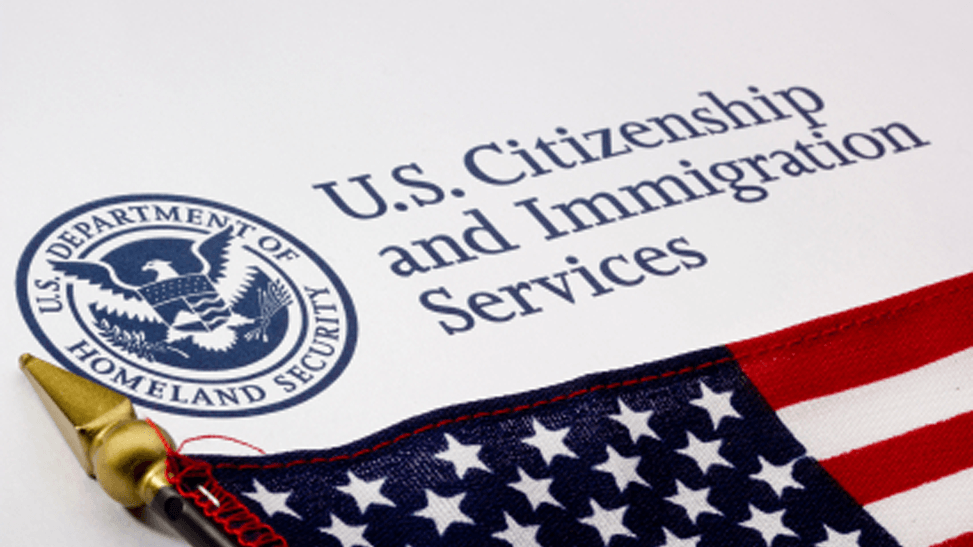Extreme Vetting – What Is It and What Are the Impacts?
Santos Lloyd Law Team • April 10, 2025
In 2025, the immigration landscape continues to shift under the weight of national security concerns, ushered in by Executive Order “Protecting the United States From Foreign Terrorists and Other National Security and Public Safety Threats.” This directive tasks federal agencies—including the U.S. Department of State—with implementing enhanced screening and vetting protocols for all foreign nationals seeking visas or other immigration benefits. The result? A dramatically intensified vetting process, along with mounting concerns from immigrants, attorneys, and civil liberties advocates alike.
Traditionally, airport security focused on verifying travel documents and screening for prohibited items, while consular officers assessed the legitimacy of visa petitions and the admissibility of applicants. Extreme vetting, however, represents a significant shift toward a far more invasive and comprehensive investigative process. It now includes detailed background checks, biometric verification, digital forensics, and expansive scrutiny of an applicant’s online presence and criminal or financial records.
Since President Trump’s second term began in January 2025, the implementation of extreme vetting has expanded rapidly. Today, border screenings go far beyond routine document checks, encompassing a full-scale evaluation of a traveler’s digital life. This pivot reflects the administration’s intensified focus on national security, but it has also triggered urgent discussions about privacy, due process, and the fairness of modern immigration enforcement.
At U.S. ports of entry—especially airports—noncitizens are now subject to rigorous and invasive procedures, including:
- Inspection of cell phones, laptops, and other devices (including deleted content)
- Review of social media activity on platforms like TikTok, Instagram, and X (formerly Twitter)
- Biometric scanning, including fingerprinting and facial recognition
These measures are no longer confined to travelers from high-risk countries. In practice, extreme vetting applies broadly across all nationalities, and increasingly affects lawful permanent residents as well.
For noncitizens, this new landscape introduces a heightened level of uncertainty and vulnerability. Delays at U.S. consulates for visa issuance or renewal are becoming routine. Travelers must now be acutely aware of these changes, and those attending consular interviews or seeking visa renewals should be prepared to provide additional documentation verifying their maintenance of status, compliance with visa conditions, and the bona fide nature of their visa applications. It is critical to organize supporting materials in advance and be ready to answer questions about employment, education, travel history, and online activity.
As the U.S. government continues to expand its use of data-driven risk assessment tools, travelers must adapt to a new normal, one where preparation is essential to navigating the immigration system without disruption.
This blog is not intended to be legal advice and nothing here should be construed as establishing an attorney client relationship. Please schedule a consultation with an immigration attorney before acting on any information read here.
Similar Posts

In recent months, the U.S. government has intensified its vetting procedures for individuals seeking entry into the United States, whether through visa applications abroad or inspection at ports of entry. This shift, prioritized by the current administration, is having a noticeable impact on immigrants, visa holders, and even lawful permanent residents (LPRs). At U.S. consulates worldwide, applicants are experiencing increased delays , often being placed into administrative processing under Section 221(g) or referred for Security Advisory Opinions (SAOs) , which can significantly prolong visa issuance. Officers are now engaging in deeper reviews of applicants' backgrounds, including their t ravel histories, social media accounts, and foreign ties . This scrutiny applies to a wide range of visa categories, from visitor visas to employment-based petitions. Importantly, officers are exercising broader discretion when deciding who qualifies for a visa, making the process more unpredictable, even for applicants with strong cases. This enhanced vetting does not end at the consulate. Individuals entering the U.S. — even those with valid visas or green cards — are increasingly subject to prolonged secondary inspections by Customs and Border Protection (CBP). Officers may ask detailed questions about prior immigration history, travel patterns, and social media activity. In some cases, travelers are asked to provide access to their electronic devices for further inspection. There are also growing reports of travelers being referred to deferred inspection or even issued a Notice to Appear (NTA) for removal proceedings, despite previously lawful entries. While some of these practices have existed in the past, the current administration has formalized and expanded them. Experts warn that additional travel restrictions or targeted bans could also emerge as part of the administration’s enforcement priorities. For employment-based applicants, these delays and complications can severely impact U.S. businesses and foreign nationals who contribute critical skills to the U.S. economy. It is more important than ever to be well-prepared before attending a visa interview or traveling internationally. Understanding your rights and preparing thoroughly can help you navigate this uncertain landscape. At Santos Lloyd Law Firm, P.C. , our immigration attorneys are ready to guide you through this evolving process and ensure you are informed, supported, and protected. Please contact us if you have questions or need assistance.

All people living in the United States, regardless of immigration status, have certain U.S. constitutional rights. If Immigration and Customs Enforcement (ICE) officers come to your workplace, they must have either (1) a valid search warrant, or (2) consent from your employer to enter non-public areas. Non-public areas could include: staff break rooms, server rooms, mechanical rooms, HR department offices, private meeting rooms, etc. However, ICE can enter public areas of your workplace (lobby, reception area, parking lot etc.) without a warrant or consent from your employer. If you encounter ICE at your place of employment, it is important to stay calm . If an officer stops you, you may ask if you are free to leave. If they say yes, walk away calmly. If they say no, stay where you are and do not attempt to leave. You have the right to remain silent. You do not have to speak to ICE, answer any questions, or show any documents . If asked about your place of birth, how you entered the United States, or your immigration status, you may refuse to answer or remain silent. If you choose to remain silent, say it out loud: “I choose to remain silent.” If officers ask you to stand in a group based on your immigration status, you do not have to move. Be prepared to assert your rights by downloading, printing, and carrying a "red card" (available at https://www.ilrc.org/red-cards-tarjetas-rojas ) that states you do not wish to speak, answer questions, or sign documents. You are not required to show immigration documents . You may refuse to show identity documents that reveal your nationality or citizenship. However, never show false documents or provide false information. If you are detained or taken into custody, you have the right to contact a lawyer immediately . Even if you do not have a lawyer, you can tell immigration officers, “I want to speak to a lawyer.” If you have a lawyer, you have the right to speak to them and, if possible, provide proof of this relationship (such as a signed Form G-28) to an officer. If you do not have a lawyer, ask for a list of pro bono (free) or l ow bono (low-cost) lawyers. You do not have to sign anything without first speaking to a lawyer. If you choose to sign any documents, make sure you fully understand what they mean, as signing may waive your rights or lead to deportation. If you believe your rights have been violated , write down what happened. Be sure to include specific details such as names, badge numbers, and exactly what was said and done. Report the violation to a lawyer or an immigrant rights organization as soon as possible. If you or someone you know may be impacted by this executive order, staying informed and understanding your rights is crucial. At Santos Lloyd Law Firm, P.C., our trusted immigration attorneys are available to provide guidance and support during this uncertain time. Please contact us if you need assistance.

In January 2025, the U.S. government introduced a mandate requiring all individuals without legal status in the country to register with federal authorities. This initiative aims to enhance national security and ensure compliance with existing immigration laws. If you or someone you know is affected by this change, it's essential to understand the specifics of this requirement and how to comply. Who Is Already Registered? Many individuals have already fulfilled their registration obligations through prior interactions with U.S. immigration authorities. You are considered registered if you have been issued any of the following documents: Lawful Permanent Resident Card (Green Card) Form I-94 or I-94W (Arrival/Departure Record), even if the period of admission has expired Immigrant or nonimmigrant visa issued before arrival Employment Authorization Document (EAD) Border Crossing Card Additionally, if you have applied for lawful permanent residence using forms such as I-485, I-687, I-691, I-698, or I-700, even if the applications were denied, or if you were paroled into the U.S. under INA 212(d)(5), you have met the registration requirement. Who Needs to Register Now? If you have not been registered through any of the means mentioned above, you are required to register under the new mandate. This includes: Individuals aged 14 or older who were not registered and fingerprinted when applying for a visa and have remained in the U.S. for 30 days or longer. They must apply before the expiration of those 30 days. Parents or legal guardians of children under 14 who have not been registered and have been in the U.S. for 30 days or longer. They must register their children before the 30-day period ends. Any individual who turns 14 years old in the U.S. and was previously registered. They must apply for re-registration and fingerprinting within 30 days after their 14th birthday. Notably, American Indians born in Canada who entered the U.S. under section 289 of the INA and members of the Texas Band of Kickapoo Indians who entered under the Texas Band of Kickapoo Act are exempt from this requirement. How to Register The U.S. Citizenship and Immigration Services (USCIS) is developing a new form and process for registration. Starting February 25, 2025 , individuals required to register should create a USCIS online account in preparation for the registration process. Once the process is implemented, registrations will be submitted through this online account. Important Considerations Registration Is Not an Immigration Status: Completing the registration does not grant any immigration status, employment authorization, or other rights or benefits under U.S. law. Consequences of Non-Compliance: Failure to comply with the registration requirement may result in fines, imprisonment, or both. At Santos Lloyd Law Firm, P.C., we are committed to guiding you through this process with compassion and expertise. Our trusted immigration lawyers are here to provide the information and assistance you need during this time. For personalized guidance and support, please contact Santos Lloyd Law Firm, P.C., and speak with one of our experienced immigration attorneys. We are dedicated to helping you navigate these changes and securing a hopeful future.

On January 20, 2025, President Donald Trump signed an Executive Order imposing new restrictions on migrants, including limitations on asylum and humanitarian protections. The order directs the Department of Homeland Security (DHS) to terminate all categorical parole programs that conflict with U.S. policies , which includes parole processes for Cuban, Haitian, Nicaraguan, and Venezuelan nationals. Additionally, this provision could impact parole programs for individuals from Afghanistan, Ukraine, and other countries. Beyond restricting parole, the executive order introduces several border security measures , including building more physical barriers, increasing the number of border personnel, and stopping the use of the CBP One mobile application . The order specifically directs the Department of Defense (DOD) and DHS to build more border walls to establish what it calls “complete operational control” of the southern border. Additionally, it ordered the immediate shutdown of the CBP One mobile app, which previously allowed asylum seekers to schedule appointments at U.S. Ports of Entry. As a result, all existing appointments have been canceled immediately . The order also initiates the reinstatement of the “Remain in Mexico” program , also known as the Migrant Protection Protocols (MPP) , across all sectors of the southern border. Under MPP, asylum seekers must remain in Mexico while awaiting the outcome of their U.S. immigration court proceedings, significantly altering the process for those seeking refuge in the country. These measures reinforce the Trump administration's broader effort to restrict asylum and humanitarian protections at the U.S. border . If you or someone you know may be affected by this executive order, it is essential to stay informed and understand your legal rights. Consulting with an immigration attorney can help navigate these evolving policies and ensure the best course of action moving forward.

The U nonimmigrant status (U visa) offers vital protection and legal relief to victims of certain crimes who have suffered mental or physical abuse and are willing to assist law enforcement in the investigation or prosecution of the crime. U visa recipients are granted a work authorization card and can live and work legally in the United States for up to four years, with a path to lawful permanent residency (green card) after having a U visa for three years. The U visa serves as a beacon of hope for survivors of crime who courageously step forward to help law enforcement while navigating their own recovery. Understanding the eligibility criteria and gathering the right documentation is essential to building a strong case. To qualify for a U visa, an applicant must meet all of the following criteria: 1. Victim of a Qualifying Crime You must have been a victim of a qualifying criminal activity , such as: Domestic violence Sexual assault Human trafficking Kidnapping Felonious assault Extortion Witness tampering Other serious offenses A full list of qualifying crimes is provided by U.S. Citizenship and Immigration Services under INA § 101(a)(15)(U). See also: https://www.uscis.gov/humanitarian/victims-of-criminal-activity-u-nonimmigrant-status . 2. Suffered Substantial Physical or Mental Abuse You must demonstrate that you suffered substantial harm as a result of the crime. This may include: Physical injuries Psychological trauma Lasting emotional distress 3. Helpful to Law Enforcement You must be, have been, or are likely to be helpful in the investigation or prosecution of the crime. This includes: Reporting the crime to authorities Cooperating with police or prosecutors Providing information that aids law enforcement efforts A law enforcement certification (Form I-918, Supplement B) is required as proof of this cooperation. 4. The Crime Occurred in the U.S. or Violated U.S. Laws The criminal activity must have: Taken place in the U.S., its territories, or possessions, and Violated U.S. federal, state, or local laws Applicants must also be admissible to the United States. If you are not, based on your immigration history, you may request a waiver using Form I-192 (Application for Advance Permission to Enter as a Nonimmigrant) . Certain qualifying family members may be included in your U visa petition: If you are under 21 years old: Your parents, unmarried siblings under 18, spouse, and children may be eligible to apply with you. If you are 21 years or older: Your spouse and children may qualify to apply with you. Each derivative must meet specific requirements and file appropriate forms. If you have any questions or would like to know more about the U visa eligibility requirements, contact our office to schedule a consultation with one of our experienced immigration attorneys.

If you’ve ever dreamed of bringing your culinary artistry to the United States —whether as a chef in a high-end kitchen, a pastry artisan designing edible masterpieces, or a baker introducing centuries-old family recipes to American diners—there may be a visa that fits you as well as your favorite apron. In the vibrant world of U.S. immigration, two options shine particularly bright for culinary professionals: the O-1B and the P-3 visa. While many assume these are only for Hollywood stars or folk musicians, the reality is that they’ve opened doors for creative professionals across fields—including those whose medium is flavor. Let’s start with the O-1B visa . This visa is for individuals with “extraordinary ability” in the arts, which USCIS defines as someone who has achieved distinction through national or international acclaim. Think of it as a spotlight on your achievements—whether you’ve been featured in culinary magazines, headlined food festivals, worked in renowned kitchens, or garnered praise from respected critics and chefs. You don’t need a Michelin star (though it doesn’t hurt)—you just need to prove that your skill and reputation put you in a class above the rest. With this visa, you can work in the U.S. for up to three years, with the possibility of extensions if you're still cooking up success. Now, if your passion lies in preserving and sharing your cultural heritage through cuisine, the P-3 visa may be the better fit. Designed for artists and entertainers coming to the U.S. to perform, teach, or coach as part of a “culturally unique” program, the P-3 visa is perfect for chefs trained in traditional methods who want to introduce authentic ethnic flavors to American tables. For example, a Japanese sushi master teaching regional techniques at culinary schools, a French chef recreating the rustic dishes of Provence in a farm-to-table restaurant in California, or an Italian baker bringing regional specialties like Sicilian cassata or Roman maritozzi to a bakery in Brooklyn. According to USCIS, the program must aim to “further the understanding or development of your art form,” and can be commercial or noncommercial in nature. The visa lasts for one year, with extensions available. So why are these options such a win for culinary professionals? For one, they bypass the long timelines and complexities of labor certification. They’re faster, more affordable, and allow your talent—or your tradition—to speak for itself. In an era where Americans are increasingly craving authentic global flavors, having a native expert in the kitchen isn’t just a trend—it’s an experience. And the U.S. immigration system is catching on. At Santos Lloyd Law Firm, we’ve helped countless culinary professionals find the right visa to match their dreams. Whether your story is written in saffron and smoke or flour and sugar, we’re here to help you bring it to life in the United States. Ready to take your career stateside? Contact us to get started—because your next chapter may be just one visa away.

In recent months, the U.S. government has intensified its vetting procedures for individuals seeking entry into the United States, whether through visa applications abroad or inspection at ports of entry. This shift, prioritized by the current administration, is having a noticeable impact on immigrants, visa holders, and even lawful permanent residents (LPRs). At U.S. consulates worldwide, applicants are experiencing increased delays , often being placed into administrative processing under Section 221(g) or referred for Security Advisory Opinions (SAOs) , which can significantly prolong visa issuance. Officers are now engaging in deeper reviews of applicants' backgrounds, including their t ravel histories, social media accounts, and foreign ties . This scrutiny applies to a wide range of visa categories, from visitor visas to employment-based petitions. Importantly, officers are exercising broader discretion when deciding who qualifies for a visa, making the process more unpredictable, even for applicants with strong cases. This enhanced vetting does not end at the consulate. Individuals entering the U.S. — even those with valid visas or green cards — are increasingly subject to prolonged secondary inspections by Customs and Border Protection (CBP). Officers may ask detailed questions about prior immigration history, travel patterns, and social media activity. In some cases, travelers are asked to provide access to their electronic devices for further inspection. There are also growing reports of travelers being referred to deferred inspection or even issued a Notice to Appear (NTA) for removal proceedings, despite previously lawful entries. While some of these practices have existed in the past, the current administration has formalized and expanded them. Experts warn that additional travel restrictions or targeted bans could also emerge as part of the administration’s enforcement priorities. For employment-based applicants, these delays and complications can severely impact U.S. businesses and foreign nationals who contribute critical skills to the U.S. economy. It is more important than ever to be well-prepared before attending a visa interview or traveling internationally. Understanding your rights and preparing thoroughly can help you navigate this uncertain landscape. At Santos Lloyd Law Firm, P.C. , our immigration attorneys are ready to guide you through this evolving process and ensure you are informed, supported, and protected. Please contact us if you have questions or need assistance.



